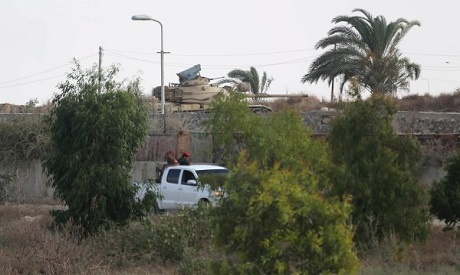
Egyptian army tank is seen as members of Palestinian security forces loyal to Hamas patrol the border area of southern Gaza Strip with Egypt, 1 July 2015 (Photo: Reuters)
Major General Hisham El-Halaby who teaches at the National Defence College of the Nasser Military academy- told Ahram Online that the initial number of militants who attacked the army in North Sinai earlier in the day was around 70.
"Those 70 who attacked the forces in Sheikh Zuweid represented the first wave of attackers. The total number of attackers throughout the day might exceed 300 elements or even more. This is a new technique that the militants have been using in their operations," El-Halaby explained.
However, El-Halaby says that there were gaps in the military’s preparedness, which were capitalised on by the militants who receive instructions from foreign intelligence agencies.
He believes that the perpetrators — whom he described as highly organized and trained — sought to deliver several messages through this attack, whether in terms of its timing or organization, or the type of deployment of the elements that implemented it.
“The militants attempted to control new territories around their current strongholds in the areas of Sheikh Zuweid and Rafah — just as their sister groups have been doing in Iraq and Libya — in order to begin to expand west towards the Suez Canal areas.
"This plan failed," said El-Halaby.
Within security institutions — including the military — El-Halaby said there is a belief that the militant operation was planned by foreign intelligence agencies.
“We are facing intelligence bodies that chose the timing, prepared the attack and the elements that executed it, seeking to confront the Egyptian state and military."
El-Halaby reasoned that the weapons used in Wednesday’s attack are usually owned by armies, not other armed groups operating in the Nile Valley or Delta region.
El-Halaby explained that anti-aircraft and C4 explosives used on Wednesday by the IS group are “ten times powerful than TNT explosives,” which are used elsewhere in Egypt by other Islamist militants.
El-Halaby said he also believes some Sinai Bedouins lend support to the militants by selling them with “modern and expensive vehicles” that “most probably have legal registration.”
“Some rights groups, whose members are above suspicion, provide a legal cover for transactions that Islamists need completed to access money to spend on operations, he claimed.
On the ability of authorities to gather intelligence, El-Halaby believes it is a difficult task to fulfill in such "a complex environment.”
“Militants adopt a counter-tactic of spreading false information, but unfortunately we have to admit there is a shortage in information that we or nobody else can overcome.”
“For instance, some sites for weapons storage have not been discovered yet. Also some tunnels are still functioning efficiently and these allow elements who are based in the Gaza Strip to pass through them. One of them was discovered in the past few days, and most probably it was used in this operation.”
Meanwhile, Major General Talaat Moussa, former head of Egypt’s military intelligence, concurred Ahram Online that some Bedouins support hundreds of domestic and foreign Islamist militants that execute armed operations against government forces in Northern Sinai.
“They [militants] have been present in Northern Sinai for a while, they didn’t all come out of the blue. Why didn't the Bedouins report this issue to the government? There is definitely a common interest between both sides”, he said.
Moussa believes that primary indicators about the planning, preparation and implementation of Wednesday’s militant attack "point to the involvement of the Muslim Brotherhood, especially after considering the timing and aim of the attack."
He believes that the [beleaguered] Muslim Brotherhood has recently managed to regain its “strategic balance” and reorganised itself through cooperation with other movements abroad - groups which also harbour the Brotherhood's goal of “confronting the Egyptian state, bringing down the regime and proving that the armed forces are incapable of handling such confrontation.”
“Such arrangements took place in Turkey via leading figures of the international Muslim Brotherhood organisation. They are all partners in the terrorist attacks' claimed Moussa.
The aftermath of the militant operation should make security forces adopt policies of "widening the circle of suspicion" and "combing of the borders," he argued.
Short link: